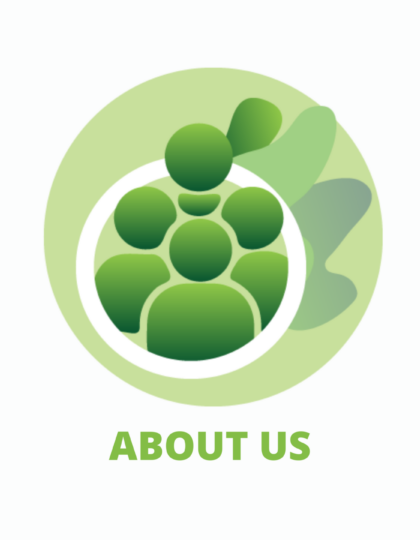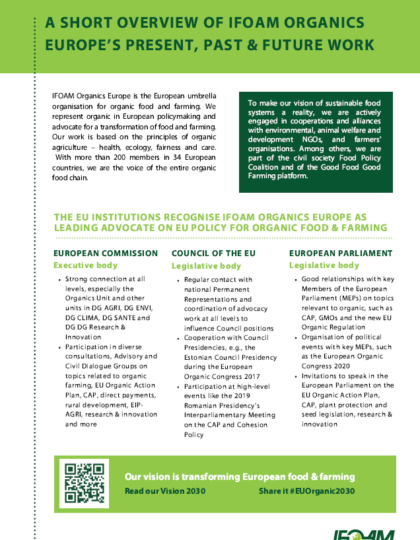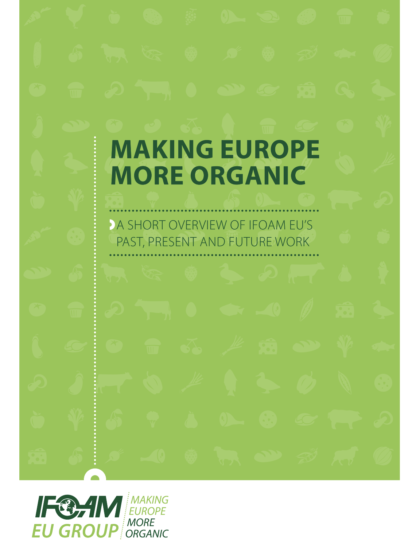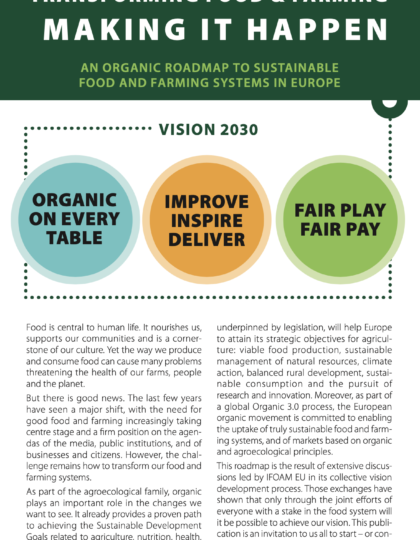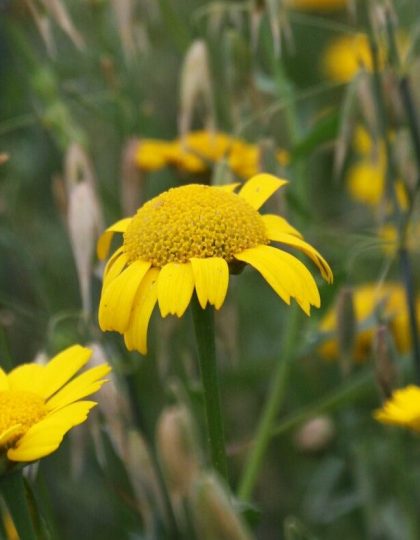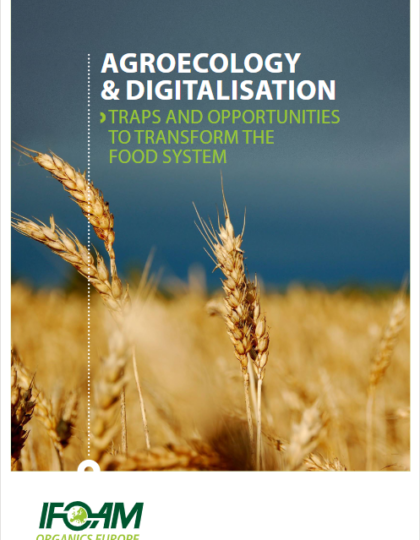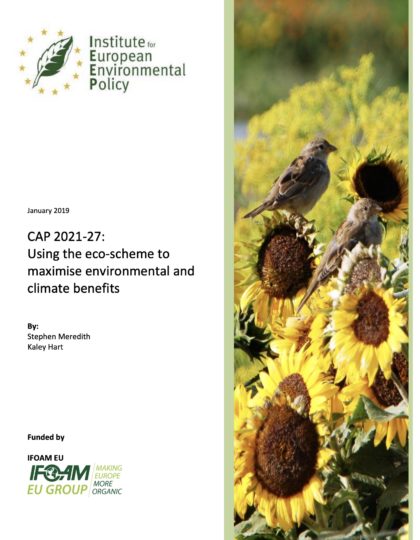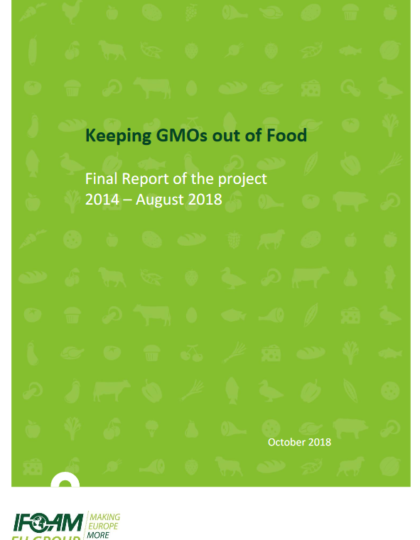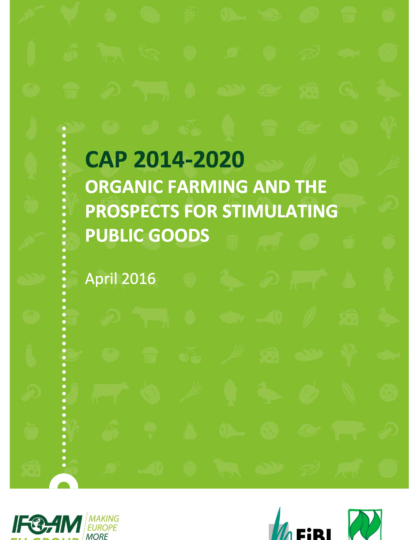In this section you can find all our resources organised by type, topic and sorted chronologically. Click on the kind of resources you’re searching for and browse our latest publications!
Library
Leaflets
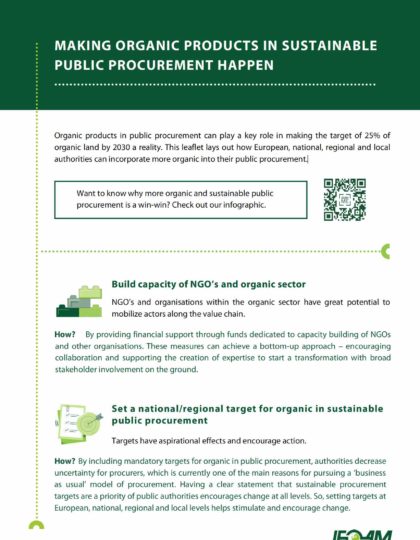
Making organic products in sustainable public procurement happen
Organic products in public procurement can play a key role in making the target of 25% of organic land by…

Plant health care in organic farming - The role of natural substances in a biodiversity-based system approach
One of organic agriculture’s defining traits is its approach towards plant health care, relying mainly on preventive and indirect measures…
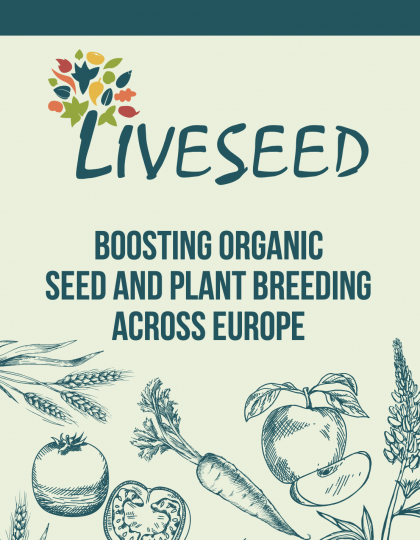
LIVESEED - Boosting organic seed and plant breeding across Europe
Seeds are the foundation of farming. Therefore, organic production should start with organic seed. Applying organic seed is mandatory according…
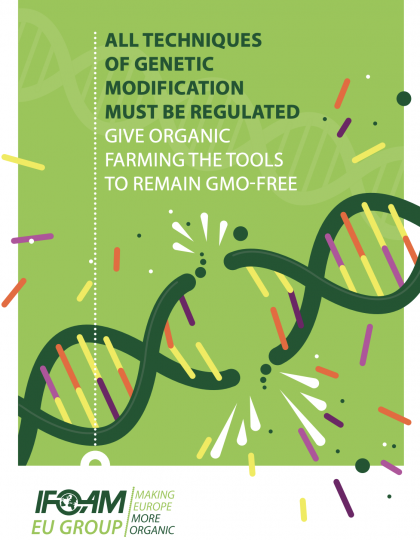
05/06/2019
GMOs
All techniques of genetic modification must be regulated
Organic farming is GMO-free per definition but is endangered by the development of new techniques of genetic modification. If their…
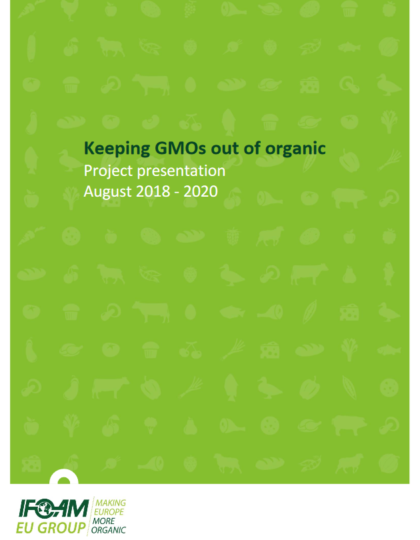
14/09/2018
GMOs
Keeping GMOs out of organic - Project presentation August 2018-2020
The project ‘Keeping GMOs out of organic’ was developed in 2018 and revised in August 2018, after the adoption of…
SOLMACC - Advocacy leaflet
Institute: Ekologiska Landbrukarna, FiBL , Bioland, AIAb and IFOAM EU
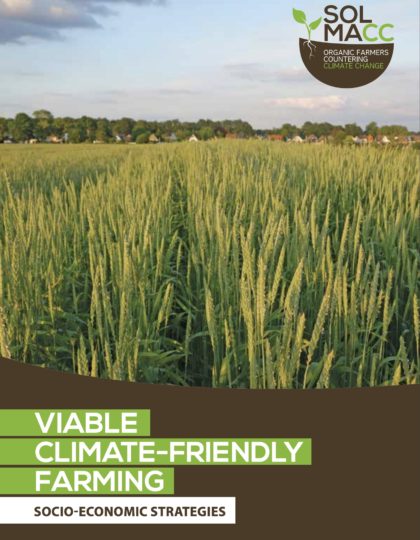
SOLMACC – Viable climate-friendly farming – Socio-economic strategies
Institute: Ekologiska Landbrukarna, FiBL , Bioland, AIAb and IFOAM EU – Authors: Sigrid Griese (Bioland), Lin Bautze (FiBL), Ann-Kathrin Trappenberg (IFOAM EU), Stephen Meredith (IFOAM EU), Eric Gall (IFOAM EU) and…
Reports and studies
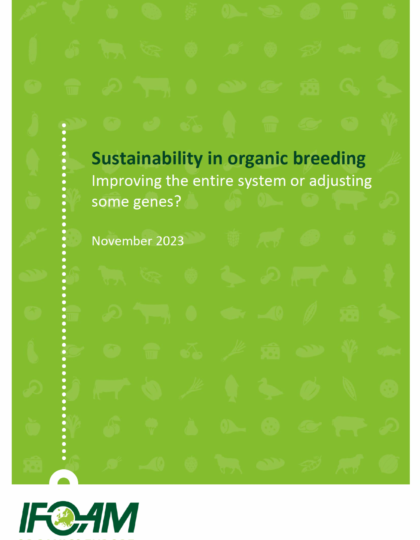
Sustainability in organic breeding. Improving the entire system or adjusting some genes?
Sustainability in organic breeding. Improving the entire system or adjusting some genes? is a briefing providing an overview of the…

23/02/2023
Plant health care
Toxicological comparison of pesticide active substances approved for conventional vs. organic agriculture in Europe
There is much debate about whether the (mostly synthetic) pesticide active substances (AS) in conventional agriculture have different non-target effects…

Environmental impacts of achieving the EU’s 25% organic land by 2030 target: a preliminary assessment
The European Union’s Farm to Fork Strategy target of a 25% organic share of agricultural land by 2030 is ambitious…

12/12/2022
Plant health care
Closing nutrient cycles: Reshaping EU agri-food system for greater autonomy and sustainability - Event report
As announced in the EU Biodiversity and Farm to Fork strategies and in the Zero Pollution Action Plan, the European…

Report on contaminants present in food - Evaluation of survey results
This report contains the results of a survey on contaminants on food and how to deal with them. The survey…
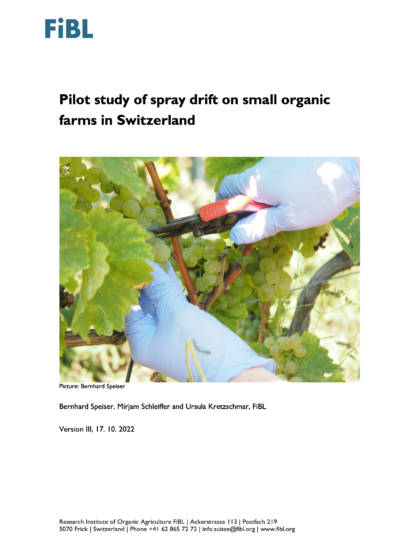
Pilot study of spray drift on small organic farms in Switzerland
Spray drift is a major problem for organic farmers, particularly in small fields (Speiser and Kretzschmar, 2021). To support the…

Cases of pesticide residues – Illustrating the decisions taken by control bodies and control authorities in Europe
The handling of organic products contaminated with pesticide residues is highly diverse within Europe. Also, differences between different actors within…
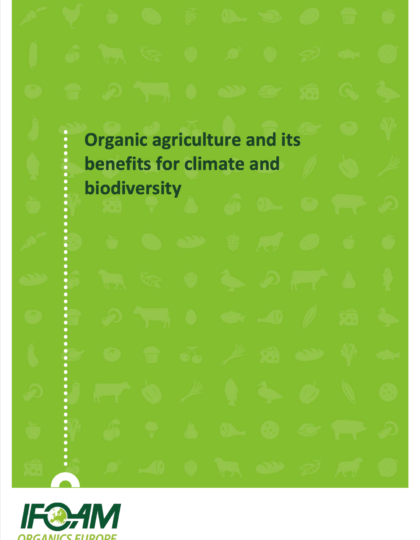
Organic agriculture and its benefits for climate and biodiversity
Changing the way we produce food can make a big difference in mitigating climate change, can help farmers to adapt…
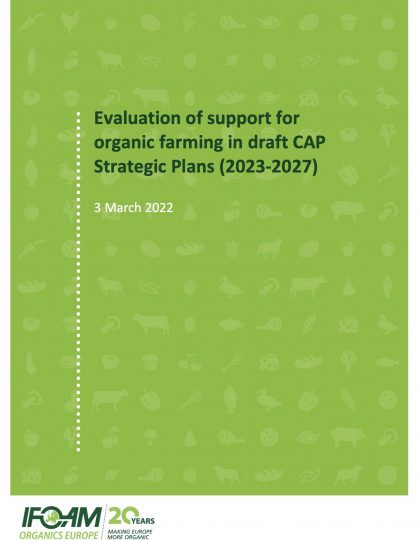
Evaluation of support for organic farming in draft CAP Strategic Plans (2023-2027)
All 27-EU Member States had to submit their Common Agricultural Policy (CAP) national Strategic Plans (SP) by 1 January 2022…

The ambition gap - Assessing organic farming support measures in current draft national CAP Strategic Plans for the Common Agricultural Policy 2023-2027
All 27-EU Member States have until 1st January 2022 to submit their Common Agricultural Policy (CAP)Strategic Plans to the European…
![Prospects & developments for organic in national CAP Strategic Plans [Country overview]](https://www.organicseurope.bio/content/uploads/2021/06/OrganicInEurope-420x540.png)
Prospects & developments for organic in national CAP Strategic Plans [Country overview]
Prospects & developments for organic in national CAP strategic plans 29 June 2021 – IFOAM Organics Europe presents the new…

Towards a just transition of food systems - Challenges and policy levers for France
IDDRI “Towards a just transition of food systems – Challenges & policy levers for France”. Aubert, Gardin (IDDRI) & Alliot…
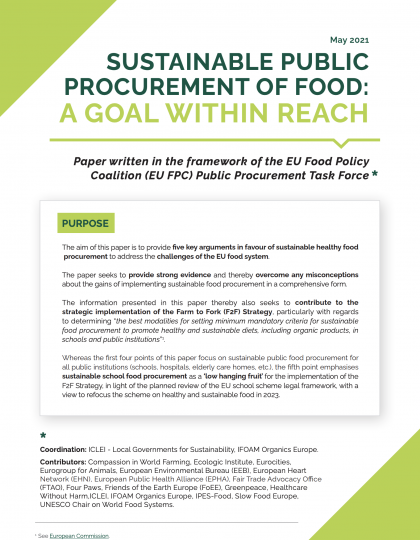
14/05/2021
Food policy
Sustainable Public Procurement of food: A goal within reach
The aim of this paper is to provide five key arguments in favour of sustainable healthy food procurement to address…
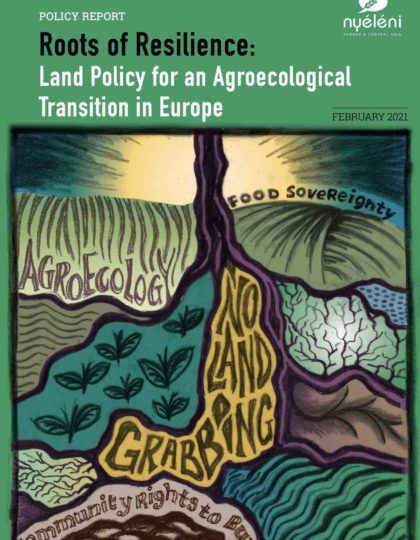
22/02/2021
Agroecology
Roots of Resilience: Land Policy for an Agroecological transition in Europe
Read the policy report report “Roots of resilience: Land policy for an agroecological transition in Europe” in EnglishRead the executive…
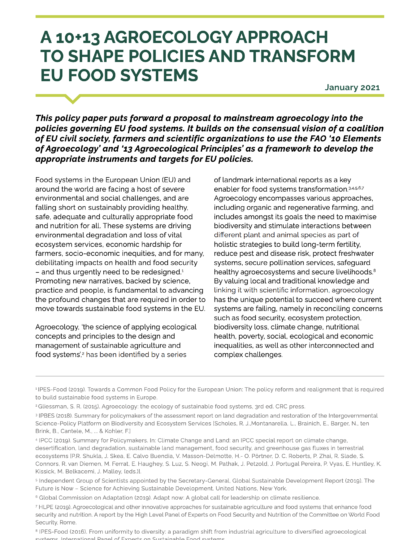
27/01/2021
Agroecology
A 10+13 agroecology approach to shape policies and transform eu food systems
This policy paper puts forward a proposal to mainstream agroecology into the policies governing EU food systems. It builds on…

Organic Agriculture and the Sustainable Development Goals – Part of the Solution
Institute: EOSTA and Nature & More – Author: Simon de Schaetzen
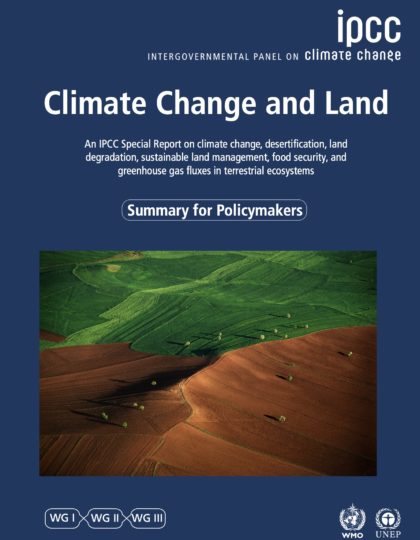
Climate Change and Land - An IPCC special report on climate change, desertification, land degradation, sustainable land management, food security, and greenhouse gas fluxes in terrestrial ecosystems
Institute: Intergovernmental Panel on Climate Change (IPCC) – Authors: 107 experts from 52 countries
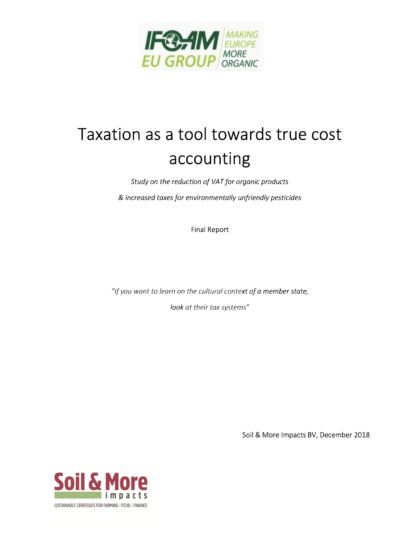
21/12/2018
Fairness & transparency
Taxation as a tool towards true cost accounting
STUDY ON THE REDUCTION OF VAT FOR ORGANIC PRODUCTS & INCREASED TAXES FOR ENVIRONMENTALLY UNFRIENDLY PESTICIDES
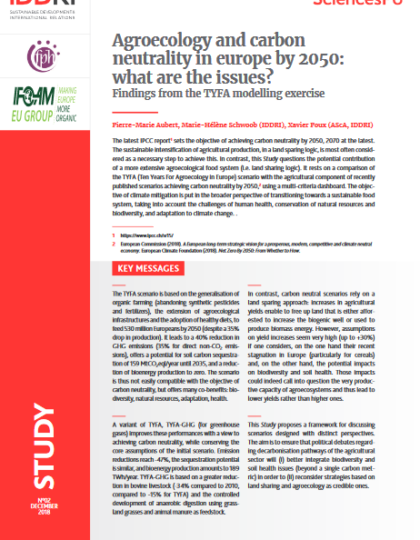
Agroecology and carbon neutrality in Europe by 2050: what are the issues?
Institute: Institute for Sustainable Development and International Relations (IDDRI) – Authors: Pierre-Marie Aubert, Marie-Hélène Schwoob, Xavier Poux


